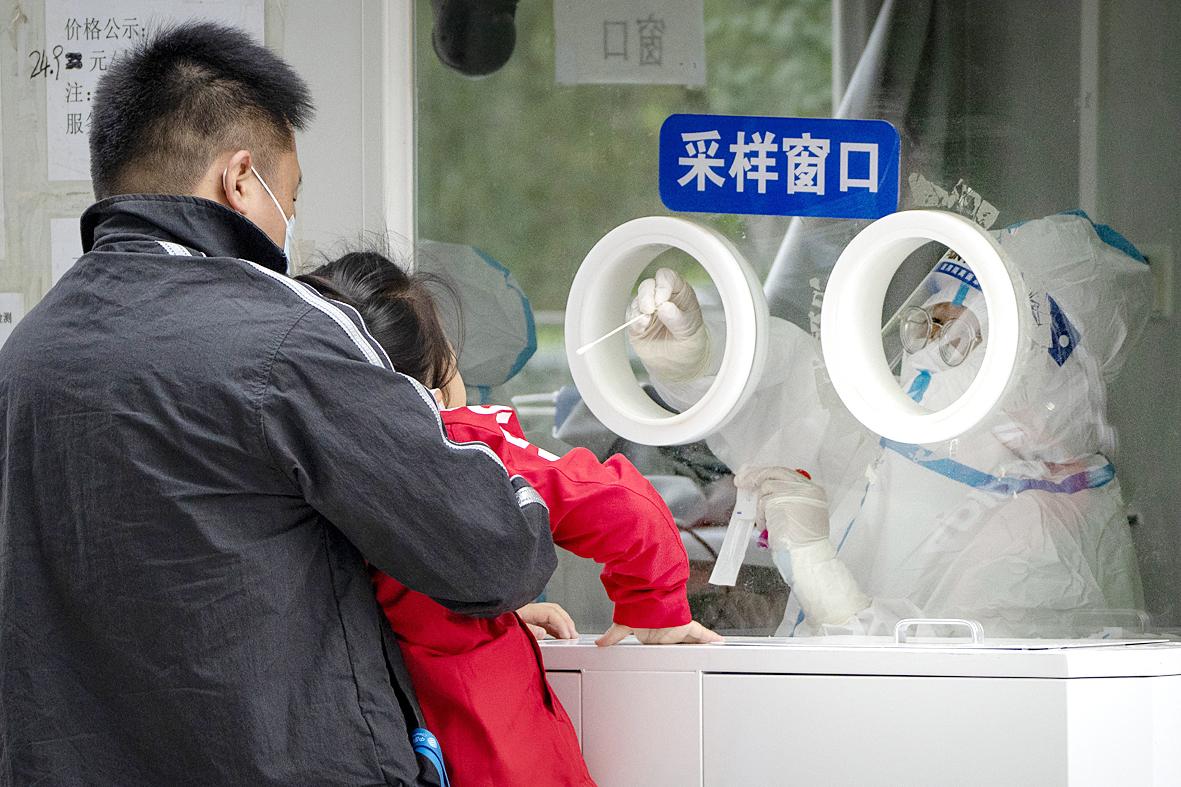The Chinese megacity of Guangzhou yesterday canceled hundreds of flights and launched mass testing of 5.6 million people after one suspected COVID-19 case, while Beijing closed some public spaces and stepped up checks at others, as most of the capital’s 22 million residents turned up for more mass testing aimed at averting a Shanghai-like lockdown.
China is facing its worst outbreak since the peak of the first wave in early 2020, with eastern Shanghai recording dozens of daily deaths and Beijing sealing off whole neighborhoods where handfuls of cases have been detected.
Under its “zero COVID” policy, China has used lockdowns, mass testing and travel restrictions to stamp out infections. The strategy is under strain, with the highly transmissible Omicron variant of SARS-CoV-2 punching through health controls.

Photo: AP
Rolling virus restrictions — including a weeks-long lockdown of virtually all of Shanghai’s 26 million residents — have damaged the economy, causing backlogs at the world’s busiest container port, a key node in the global supply chain.
Yesterday, Guangzhou, a major trade and manufacturing hub in southern China, announced mass testing for almost one-third of its nearly 19 million residents after an “abnormal” test result was detected at its airport, where most flights have been canceled.
Meanwhile, the tech hub of Hangzhou near Shanghai late on Wednesday ordered 9.4 million downtown residents out of its population of 12.2 million to get tested every 48 hours if they want to access public spaces and transportation.
The aim is “that the virus has nowhere to hide or settle,” the city government said in a statement, raising fears of further restrictions across a city that is home to some of China’s biggest companies.
China yesterday reported 11,367 new infections, a small daily tally compared with most major global economies, but enough to rattle authorities in a country that had until recently emerged relatively unscathed by the COVID-19 pandemic.
More than 10,000 of yesterday’s new cases were detected in Shanghai, where cases are trending downward after a weeks-long lockdown that has enraged residents, and seen rare protests against a government accused of bungling the response and failing to feed people confined at home.
The city is waging a campaign to reach zero cases at the community level, or no transmissions outside areas under lockdown.
Over the past few days, more housing compounds have lifted movement restrictions and authorities yesterday said that 90 percent of new infections were found in quarantined areas.
About 50 new cases were found in Beijing, the seat of government for Chinese President Xi Jinping (習近平), who has until now hailed China’s virus response as an example of the superiority of the country’s communist leadership.
The capital this week launched mass testing of nearly all of its 21 million residents and yesterday locked down more housing compounds in its populous Chaoyang District.
Residents are on high alert of a potential wider lockdown, with large gatherings, group travel and weddings suspended, while some schools have moved online.

Kehinde Sanni spends his days smoothing out dents and repainting scratched bumpers in a modest autobody shop in Lagos. He has never left Nigeria, yet he speaks glowingly of Burkina Faso military leader Ibrahim Traore. “Nigeria needs someone like Ibrahim Traore of Burkina Faso. He is doing well for his country,” Sanni said. His admiration is shaped by a steady stream of viral videos, memes and social media posts — many misleading or outright false — portraying Traore as a fearless reformer who defied Western powers and reclaimed his country’s dignity. The Burkinabe strongman swept into power following a coup in September 2022

‘FRAGMENTING’: British politics have for a long time been dominated by the Labor Party and the Tories, but polls suggest that Reform now poses a significant challenge Hard-right upstarts Reform UK snatched a parliamentary seat from British Prime Minister Keir Starmer’s Labor Party yesterday in local elections that dealt a blow to the UK’s two establishment parties. Reform, led by anti-immigrant firebrand Nigel Farage, won the by-election in Runcorn and Helsby in northwest England by just six votes, as it picked up gains in other localities, including one mayoralty. The group’s strong showing continues momentum it built up at last year’s general election and appears to confirm a trend that the UK is entering an era of multi-party politics. “For the movement, for the party it’s a very, very big

ENTERTAINMENT: Rio officials have a history of organizing massive concerts on Copacabana Beach, with Madonna’s show drawing about 1.6 million fans last year Lady Gaga on Saturday night gave a free concert in front of 2 million fans who poured onto Copacabana Beach in Rio de Janeiro for the biggest show of her career. “Tonight, we’re making history... Thank you for making history with me,” Lady Gaga told a screaming crowd. The Mother Monster, as she is known, started the show at about 10:10pm local time with her 2011 song Bloody Mary. Cries of joy rose from the tightly packed fans who sang and danced shoulder-to-shoulder on the vast stretch of sand. Concert organizers said 2.1 million people attended the show. Lady Gaga

SUPPORT: The Australian prime minister promised to back Kyiv against Russia’s invasion, saying: ‘That’s my government’s position. It was yesterday. It still is’ Left-leaning Australian Prime Minister Anthony Albanese yesterday basked in his landslide election win, promising a “disciplined, orderly” government to confront cost-of-living pain and tariff turmoil. People clapped as the 62-year-old and his fiancee, Jodie Haydon, who visited his old inner Sydney haunt, Cafe Italia, surrounded by a crowd of jostling photographers and journalists. Albanese’s Labor Party is on course to win at least 83 seats in the 150-member parliament, partial results showed. Opposition leader Peter Dutton’s conservative Liberal-National coalition had just 38 seats, and other parties 12. Another 17 seats were still in doubt. “We will be a disciplined, orderly